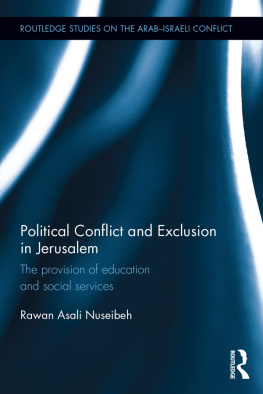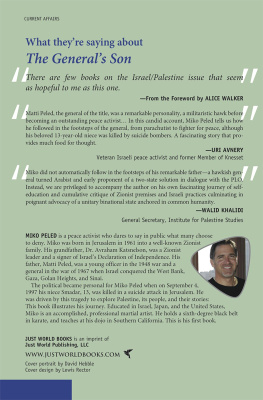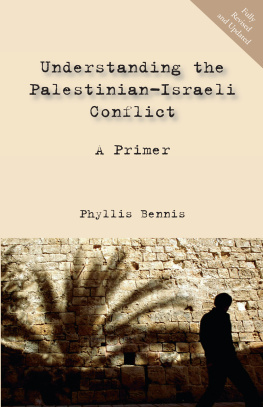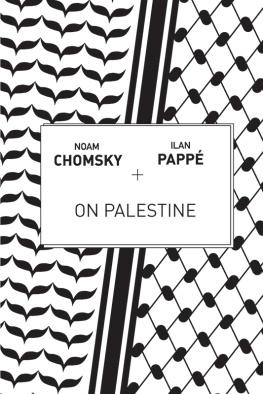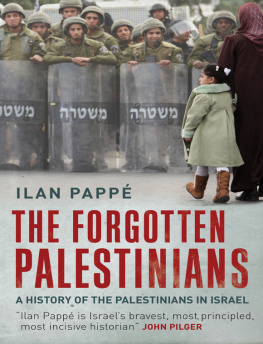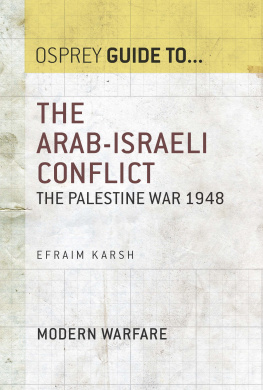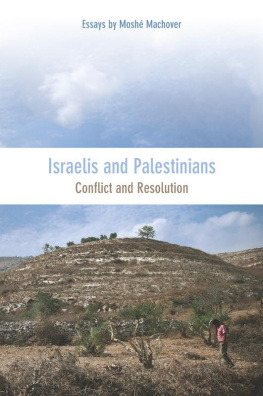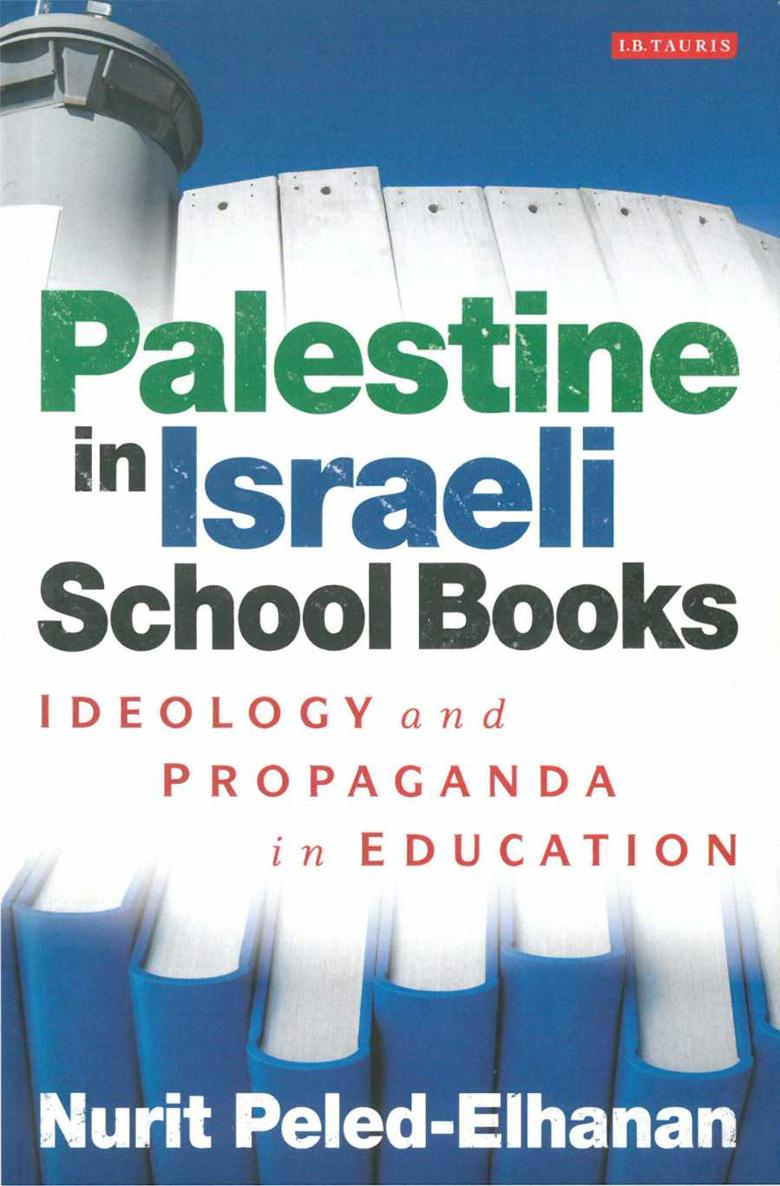
Nurit Peled-Elhanan is Lecturer in Language Education in the Faculty of Education at the Hebrew University of Jerusalem. A co-recipient of the 2001 Sakharov Prize for Human Rights and the Freedom of Thought, awarded by the European Parliament, she has written extensively on Israeli education, and is a regular speaker and writer both in Europe and in the USA on matters concerning the Israeli occupation and its effects on both Israelis and Palestinians. She is a member of the Israeli-Palestinian Bereaved Parents for Peace, and one of the founders of the Russell Tribunal on Palestine 2009.
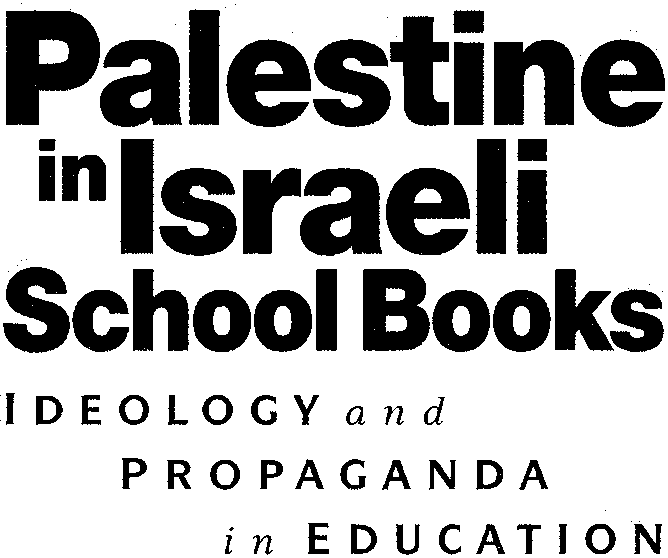
Nurit Peled-Elhanan

Paperback edition published in 2012 by LB.Tauris & Co Ltd
6 Salem Road, London W2 4BU
175 Fifth Avenue, New York NY 10010 ww w. ibcau ris .com
Distributed in the United States and Canada
Exclusively by Palgrave Macmillan
175 Fifth Avenue, New York NY 10010
First published in hardback in 2012 by I.B.Tauris & Co Ltd
Copyright 2012 Nurit Peled-Elhanan
The right of Nurit PeledElhanan to be identified as the author of this work has been asserted by the author in accordance with the Copyright, Designs and Patent Act 1988.
AU rights reserved. Except for brief quotations in a review, this book, or any part thereof, may not be reproduced, stored in or introduced into a retrieval system, or transmitted, in any form or by any means, electronic, mechanical, photocopying, recording or otherwise, without the prior written permission of the publisher.
ISBN 978 1 78076 505 1
A full CIP record for this book is available from the British Library
A full CIP record for this book is available from the Library of Congress
Library of Congress catalog card: available
Typeset by Newgen Publishers, Chennai
Printed and bound by CPI Group (UK) Ltd, Croydon, CRO 4YY
The human psyche has two great sicknesses: the urge to carry vendetta across generations and the tendency to fasten group labels on people rather than see them as individuals.
Richard Dawkins
CONTENTS
1 The Representation of Palestinians in Israeli School Books 48
2 The Geography of Hostility and Exclusion:
3 Layout as Carrier of Meaning: Explicit and
PREFACE
History is never said or read innocently for it is always for someone.
(Jenkins, 1991: 86)
In Israel, school books are written for youngsters who will be drafted into joining compulsory military service at 18 years of age and carry out the Israeli policy of occupation in the Palestinian territories.
The concern of the present study is not to describe Israeli education as a whole but rather to focus on one specific question: how are Palestine and the Palestinians against whom these young Israelis will potentially be required to use force, portrayed in school books?
My special interest in school books stems from the conviction I share with other researchers, both in Israel and in other countries, that in spite of all other sources of information, school books remain powerful means by which the state shapes forms of perception, of categorization, of interpretation and of memory, that serve to determine personal and national identities. This is true especially in nations such as Israel where history, memory, [personal identity} and nation enjoy an intimate communion (Nora, 1996: 5).
Four years ago, a student of mine, Tai Sela, wrote a preface to his term-paper which consisted of the analysis of Israeli history textbooks:
On the 5th of September 1997 I found myself in Lebanon, on a rescuing mission. All my friends were in the battle, 12 soldiers were killed ...A year later I was in deep depression. Sad and morose. I decided to consult a psychologist. After a few sessions {... ] I could reorganize my thoughts. Then I understood that the mental crisis I had was in fact a moral crisis, a crisis of consciousness. What I actually felt was frustration, shame and anger.
How could I be so gullible and let myself be duped? How can I explain that a man of peace exposes himself to such a morbid experience of his own free will? Today, I saw an officer put tight handcuffs on a taxi driver because he failed to obey the soldiers order to park here and not there. 4We told him a thousand times the soldiers said. The man was lying on the ground in the worst heat of the summer, thirsty, for hours on end. His friend was luckier: He had to stand on his feet, in a cell, without handcuffs.
What pushes these young Israeli boys to play the role of supreme judges until they lose all judgment? In my opinion it is the Grand Zionist Narrative which serves, explicitly as well as implicitly, as a collective conscience to the whole Israeli society. This grand narrative is the system of values that makes us belong to this particular collective.
This book presents a critical study of one aspect of this narrative as it is reproduced in school books of three disciplines: history, geography and civic studies. It consists of an analysis of the visual and verbal texts that represent the others of Zionist Jews, namely Palestinians - both the citizens of Israel and the non-citizens who have been living under a military regime in the occupied Palestinian territories since 1967.
The study is guided by my own reading. The philosopher Michael Waltzer notes that critics are not disembodied hermetic individuals, but interested members of specific societies and social groups with specific points of view (Waltzer, 1987: 43). This view is shared by literary critics, philosophers and discourse analysts who see the act of reading as a personal meaning-making, whereby the reader is Tilling elements with content and making sense of these elements (Kress, 2003: 38). The sense is never entirely dictated by the writer, as Renaissance French philosopher Michel de Montaigne had already observed, La parole est moitie a celui qui parle moitie a celui qui ecoute (Montaigne, Essais III).1
My own reading and the intertextual connections that I found in the textbooks 1 analyzed are the basis of my interpretation. Literary scholar Samoyault (2003: 68) explains that in the act of reading the reader is solicited by the intertext on four levels: her memory and her culture; her inventiveness and her playful spirit. All four levels are required to explore the possibilities offered by the multimodal, multi generic and non-linear reading of school book texts because school books are intertexts by their nature: they both refer to other texts and transform texts of different genres (Kress, 2003: 140). The intertextual connections found in the school books analyzed here are informed by my knowledge of Israeli political, cultural, social and educational discourses, and my ideological stance which is what Reisigl and Wodak describe as empathic with the victims of discrimination (2001: 35).
INTRODUCTION
A JEWISH ETHNOCRACY IN THE MIDDLE EAST
In spite of Israels success to advertise its regime as a Democracy, it is often defined by researchers as either an Ethnocracy or as an ethnic Democracy. This is because ethnicity1 and not citizenship is the main determinant for the allocation of rights, power and resources in Israel. Jews who are citizens of other countries and Jewish settlers who live beyond the official border of the state have full citizenship rights while Arab citizens inside the states borders dont, and Palestinians from the occupied West Bank are listed state-less.
Next page



